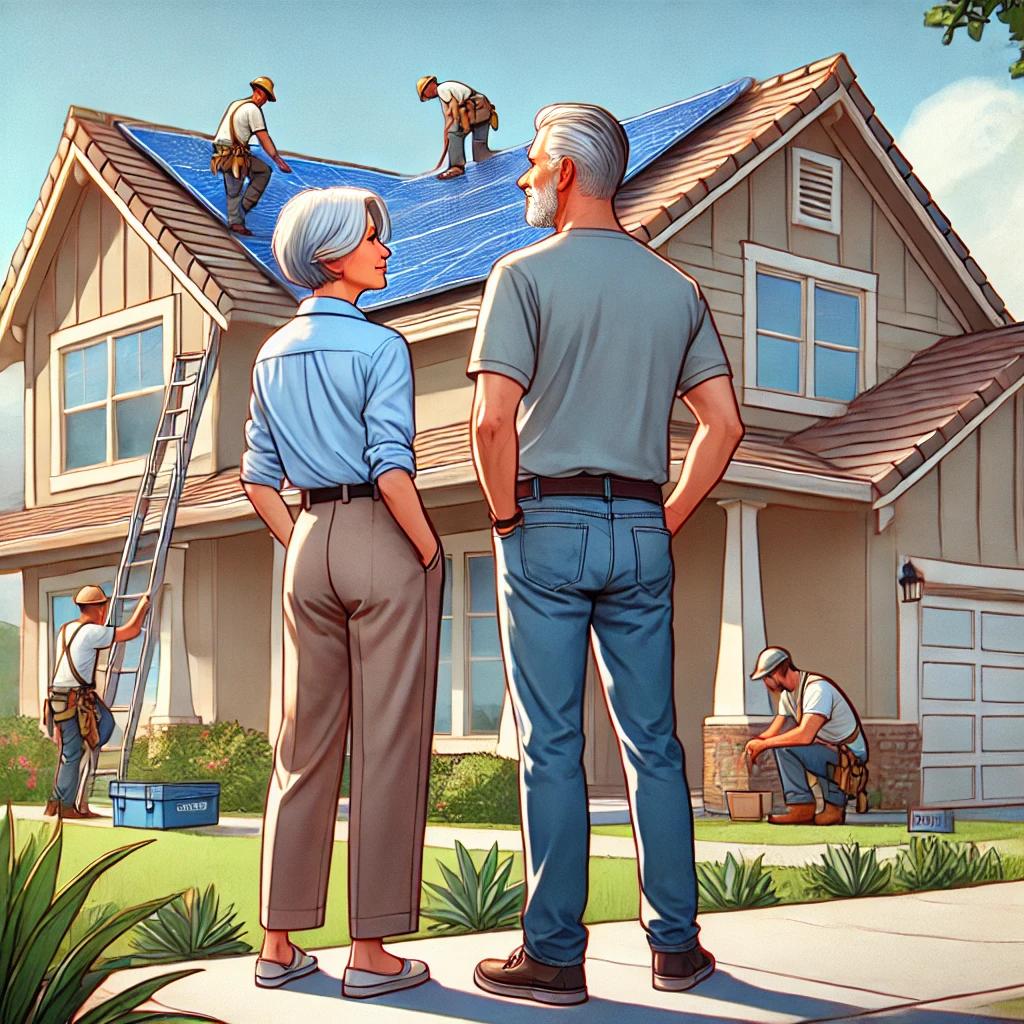Last updated on September 13th, 2025 at 08:35 pm
Thinking of installing a residential solar system on your home? If you are retired or about to retire, buying a solar installation may not be the best move. It seems that everyone is offering free solar, but there is nothing free about it. Taxpayers support the installation of solar just as they do the purchase of electric cars. Before you jump and sign that solar loan or solar lease, read this article.
Calculators appear at the end of this article
There are some important numbers in the calculation. First, you are a senior, which means you are probably 65 or older. According to the IRS, the life expectancy of a 65-year-old person is 22.9 years. The average time seniors over age 60 stay in their homes is 14 years. If you want to install a solar panel system, you need to amortize the cost of the system over many years. The average life of a solar system is 20-25 years.
Can you see where I am going with this? You will probably not stay in your home long enough to reap the benefits of the system, if there are any.
Major factors to consider before buying solar
Age Consideration: For individuals under 60, the extended timeline often required for break-even aligns better with a solar investment. Those over 60 might still benefit if the other factors align well, but they should weigh the payback period against their plans for homeownership.
High Electricity Rates: Living in a region with high kWh rates (like California and New York) makes solar much more cost-effective, as the savings on utility bills will be greater and the system will break break-even faster.
Cash Payment: Avoiding finance charges with a cash purchase is a smart strategy, especially on a fixed income, as financing often adds interest that can dilute long-term savings. Upfront payments remove these fees and increase the net benefit.
Long-Term Housing Plans: Staying in the same house for at least 15–20 years allows homeowners to benefit fully from solar savings after the break-even period. If selling sooner, it’s best to consider if solar adds resale value in that market.
Reputable Installer: Choosing a reputable installer reduces the risks of poor installation and costly repairs down the line. Checking reviews, certifications, and warranties is essential to protect your investment.
Insurance Coverage: Confirming with your insurance provider that damage from installation is covered adds a safety net, as roof issues from poor installation could lead to expensive repairs.
Local ordinances: Installing solar panels creates issues for firefighters. Some cities may require permits for installation and fees to contribute to their fire department. Check with your city first.
⚡ Key Solar Buy‑Back / Net Metering Programs in Mississippi
| Utility / Regulator | What they offer / Basic Terms | Key Limitations / Notes |
|---|---|---|
| Entergy Mississippi | Offers a Solar Net Metering Program so that customers with solar panels can send excess energy back to the grid and get credits. Entergy Mississippi | One‑time non‑refundable fee ($95–$135) for interconnection. Residential systems at “Level 1” are 20 kW or less. Entergy Mississippi |
| Mississippi Power | Net Metering rules under their “Renewable Energy Programs.” Excess electricity produced can be exported back to the grid; customers get credit for that. mississippipower.com+1 | There are caps on system size depending on customer type (residential vs. non‐residential). Also, the credit might be based on avoided cost + rate adders (i.e., not always full retail price). Greentech Renewables+2Mississippi Public Service Commission+2 |
| Mississippi Public Service Commission (PSC) | Established state rules for distributed generation / net metering. The excess energy is credited monthly; customers may carry over credits. There’s also a rate “adder” (e.g. +2.5 cents/kWh) over the utility’s avoided cost when exporting energy. Mississippi Public Service Commission+1 | The adders help boost compensation, but even with them the return for excess generation may be less than full retail rate. Also, many electric cooperatives are not required to follow these PSC rules (they may have their own or none). EcoWatch+2Mississippi Public Service Commission+2 |
| Singing River Electric (Cooperative) | Allows customers to own solar / distributed generation, and when possible, “sell the excess electricity back” (or more precisely, be compensated by their wholesale power provider) under their DG rules. Singing River Electric Cooperative | Because it’s a cooperative, rules may differ, capacity limits might apply, compensation may be based on wholesale values rather than retail, and certain eligibility criteria (location, meter type, etc.) may be stricter. Singing River Electric Cooperative |
Utility buyback program
Utility Buyback Program: Net metering or buyback programs allow you to sell excess power back to the grid, significantly boosting the financial return of a solar system. It’s essential to verify that the local utility offers this.
Condition of your roof: Is your roof in good condition? The last thing you want to do is install a new solar system on an old roof that must be replaced soon.
Optimal Light Exposure: Solar panels need sufficient sunlight to be efficient. Homes with high exposure to southern and western light are prime candidates. Those with heavy tree cover or minimal sun exposure might not achieve ideal energy production, extending the break-even time.
Financial Viability: This final point reinforces the need to calculate the system’s total cost and estimated savings. Reviewing these numbers can confirm if solar aligns with financial goals, providing a solid return on investment.
Selling your house: How much will you recover from your investment? Read the section below, Impact on Real Estate Value
Will your home warranty cover repairs? if you have a home warranty from a builder or a third party, will they honor the warranty if something goes wrong, such as repairing the roof?
For retirees, taking these factors into account can make the difference between a smart investment and an undue financial burden. Solar can be worthwhile, but careful consideration is key.
Seniors are a target for dishonest solar salespeople
Seniors and retirees are a group ripe for shady solar salespersons to close a deal with. The primary offer is free solar panels, solar programs, or solar incentives, all designed to get you to commit to a large expense over a long period on a fixed income. Not that installing solar panels is a bad move for everyone.
“Free solar installation” offers are sometimes used by deceptive companies to lure customers into signing long-term contracts with hidden costs, misleading terms, or unfavorable financing options. Here are some common tactics these companies use and what to watch for:
1. “No Upfront Cost” or “Free Panels” Claims
- Scammers may promise “free” panels, but these installations usually come with hidden fees, high-interest financing, or costly leases.
- They might mask the true cost by rolling it into monthly payments that end up more expensive over time.
2. Locked-In Long-Term Contracts
- These contracts often bind the homeowner to 20+ years, with minimal options to cancel.
- Terms might include rate escalators, which increase payments each year, often outpacing the savings.
3. Overly Aggressive Sales Tactics
- Some salespeople pressure seniors or individuals who aren’t as tech-savvy into making hasty decisions, offering no time for questions or research.
- They may insist on signing paperwork immediately or use scare tactics about rising energy costs.
4. Misleading Savings Promises
- Companies may guarantee substantial savings or even eliminate electric bills, which is unrealistic in many cases.
- They might exaggerate benefits or downplay the time required to reach break-even, often avoiding discussions of the true payback period.
5. Misrepresentation of Government Incentives
- Scammers may mention government rebates or “special programs” that supposedly cover the cost, implying the program is time-sensitive.
- Real incentives are typically available through federal or state agencies and are not exclusive to specific companies.
How to Protect Yourself
- Research the Company: Look up reviews, check the BBB rating, and see if they have proper licensing and certifications.
- Understand the Terms: Read all contracts carefully, especially lease or power purchase agreements (PPAs).
- Avoid signing on the Spot: Reputable companies will allow time for research and consultation.
- Get Multiple Quotes: Compare offers from multiple solar installers, including ones with good reputations.
- Verify Incentives Independently: Visit official sites like Energy.gov to understand real solar incentives.
These steps can help homeowners, especially seniors, avoid scams and make informed decisions about solar installations.
What about that warranty?
There are many other factors as well, such as obtaining a building permit, additional charges for electric car connection, and/or storage batteries. What about the warranty on the panels and the installation? How hard is it to have the installer return for a repair? Have you called any references with installations five years old or older?
You may be a person who wants to save the planet (reduce your carbon footprint), so you are going to install solar for that reason. Go ahead. If you have money to burn and do not care about the cost, and your fixed income can support it, why not?
I just went through the process of calculating the value of installing solar panels on my house. As I suspected, after the entire payoff period of 25 years, there were zero savings in today’s electric rates. The main reason is that I buy my electricity from an electric cooperative, as many people do.
Our electricity rates are reasonable compared to other areas. The best way to explain how this works is to show you my calculations.
Lease vs Cash for a solar system
1. Ownership
- Leasing:
- The solar provider owns the system.
- You pay a monthly fee to use the electricity it generates.
- At the end of the lease term (usually 20–25 years), you may have the option to renew the lease, purchase the system, or have it removed.
- Paying Cash:
- You own the solar system outright.
- You are responsible for maintenance and repairs unless covered by warranties.
- You gain full control over the system and its output.
2. Upfront Costs
- Leasing:
- Minimal or no upfront cost. Some leases may require a small down payment.
- Monthly lease payments are often fixed or escalate slightly over time.
- Paying Cash:
- Significant upfront investment, typically $15,000–$25,000, depending on the system size and location.
- No ongoing payments beyond maintenance costs.
3. Savings and ROI
- Leasing:
- Monthly savings on electricity bills are usually less than for owned systems because you’re paying a lease fee.
- No direct return on investment since you don’t own the system.
- Long-term savings may be less because lease payments reduce your net benefit.
- Paying Cash:
- Higher long-term savings as you avoid monthly lease payments.
- You earn a return on investment as the system offsets electricity costs.
- Payback periods (time to recoup the cost) are typically 6–10 years, after which electricity savings are effectively free.
4. Incentives and Tax Benefits
- Leasing:
- Incentives like federal tax credits, state rebates, and Renewable Energy Certificates (RECs) typically go to the leasing company.
- Paying Cash:
- You qualify for all applicable tax credits and incentives (e.g., the U.S. federal solar tax credit of 30%).
- These can significantly reduce your net cost.
5. Maintenance and Repairs
- Leasing:
- The leasing company is usually responsible for maintenance and repairs.
- This reduces risk and effort for the homeowner.
- Paying Cash:
- You are responsible for maintenance and repairs, though most systems come with warranties (e.g., 10–25 years for equipment).
- Ongoing maintenance costs are typically low but may include inverter replacements after 10–15 years.
6. Impact on Property Value
- Leasing:
- Can complicate property sales because the new owner must take over the lease.
- Some buyers may view a lease as a liability.
- Paying Cash:
- Increases property value since the solar system is an owned asset.
- Owned systems are a strong selling point in energy-conscious markets.
7. Flexibility
- Leasing:
- You are locked into a contract for the lease term.
- Breaking the lease early (e.g., when selling your home) may involve fees or complications.
- Paying Cash:
- Greater flexibility as you own the system.
- You can sell the home with the system included or potentially transfer warranties to the new owner.
Which Option is Best?
- Leasing is better if:
- You have little or no upfront cash.
- You want to avoid responsibility for maintenance.
- Your primary goal is to reduce electricity bills without ownership concerns.
- Paying Cash is better if:
- You can afford the upfront cost.
- You want maximum financial returns and full ownership.
- You plan to stay in the home long-term and benefit from the savings.
Electricity rates in Mississippi are very low, making it a challenge
The electricity prices in my area of the Mississippi Gulf Coast are about $0.134 per kilowatt hour. This includes several individual charges that make up the electric bill. I arrived at the cost per kilowatt hour by dividing the “kWh” usage for a month by the total cost of all of the charges. This rate is lower than in much of the country, making it a challenge to own a solar system that makes financial sense.
It’s very important that you take a good look at your bills over the past year or even two years. To properly calculate the electricity usage and electricity costs, you must divide the year into summer and winter. You have more sunlight in the summer than in the winter, which has an impact on the amount of energy savings, if any, you would achieve.
My utility provider, Singing River, has a tool on their website to determine your payback for installing a solar array on your roof. I used this tool, and the results are below.

The rebate is not enough to cover the cost of the system
While Singing River does pay a modest amount for any power that I would generate in excess of what I use, that extra money does not go far enough to justify the cost of solar panels. Using the results above and considering that panels will be warranted for about 20 years, cash or loan payments will go beyond the warranty period.
Further, the cost of removing and replacing panels to change the roof at least once is estimated at $4,500. This is just an example using my house, and these numbers are real for me. We have lots of sun, and my house is facing south for maximum exposure. Check out your utility company and see if they have a calculator you can use.
Solar power purchase agreements are required before you can sell power from your solar energy system to the local utility.
What happens when the solar installer goes out of business?
There are two parts to a warranty. Labor and materials. If the installer goes out of business, the property owner will have to find another installer for repairs and pay the bill. If the panels are defective or get broken and would otherwise be under warranty, you can make a claim with the manufacturer.
The problem is that you may not have been given the manufacturer’s warranty and data from the installation to prove they were installed properly. It’s critical that you receive all the information necessary to make a claim directly to the manufacturer if your installer goes out of business.
Most installers are small companies, and they start up and go out of business on a regular basis. An option is to have them buy a home warranty for you that covers the solar system. The home warranty companies are larger and are unlikely to go out of business.
Consider buying a solar-specific home warranty. A company called Solar Insure sells policies that cover all labor and costs for a very long time. With this type of warranty, you can have your system repaired without additional cost.
Government solar subsidies can not be counted upon
California reduced the rate it pays for excess power by up to 75% by introducing a “net metering” system. To avoid criticism (there was much anyway), they left the old system in place for existing solar owners and implemented the new one for new solar owners. This is a good example of how these government subsidy programs have to come to an end, with ratepayers holding the bag.
FYI, California is a net importer of electrical power, with between 25% and 35% coming from neighboring states. Even with a large number of household solar systems in place, CA still needs more energy.
Before exploring the cost part of this discussion further, you should know that most of the electricity produced in the U.S. comes from natural gas, coal, or nuclear sources. These forms of power are reliable and continue when the sun is down. Part of the cost of power to your home is the cost of getting it there. Power lines, maintenance on those lines, and the cost to build and operate generators.
Government solar credits
You may be eligible to receive solar credits. For most seniors, this effectively means nothing. The credits are in the form of tax deductions that most seniors can not use. Solar sellers tell you about what you can get, but if you are living on social security and interest from your savings, you do not need solar credits that you can not use.
As of December 2025, the Federal 30% subsidy goes away.
Even if your house generates 100% of what you need, it will only do so during the day without storage batteries. Your home must still be connected to the grid for those times when your system is not generating enough power. The standby charges are included in your bill, something that you can not avoid unless you live in the country and are not connected to the grid.
Climate change is a concern, but the electric bill is more important
Seniors may be interested in climate change, but it’s been my experience that they are more interested in how much they owe the electric company each month. A solar tax credit will do no good for a senior who does not earn enough to pay federal income taxes. Seniors who want to help the environment can recycle their plastic grocery bags.
When solar installers throw around terms such as “financial incentives,” they usually mean that fat 30% tax credit offered by the Federal Government. Once again, if you are a senior in a position where you do not pay income taxes, this is not a benefit. A Federal tax credit is only good when there is no requirement to expend capital, and you get it anyway. This is not the case with any of the solar projects that you may purchase.
Now that I have wiped the tax incentives off the table, it makes little financial sense to buy a solar system in most areas. California and New York are two high-cost states where it may just work out financially. Many retired couples are at home much of the day, and unlike working families who are out of their homes for up to 8 hours, electricity is being consumed regularly.
Other factors
If your home is vacant during much of the day, then you can sell more of the power generated to the grid. Some states have a solar investment tax credit, which is nice if you have enough income to take advantage of it.

What’s the cost of a solar system for your house? Get the whole story, not just parts, but labor, supplies, permits, and warranties. You need to know what the initial investment is going to be before making a commitment. If you decide to finance the system, what is the APR? The initial cost to you, exclusive of credits, the real cash price, is important to know.
Remember, a solar system sits on a roof that ages. At some point, it must be replaced, and it will cost thousands to remove and reinstall the solar system.
If you live in an HOA area, you may need approval to install residential solar panels. If you own a condo, you may not be able to gain approval to install a solar power system since the roof is shared.
Permits are required
Most communities require a permit to install solar panels on a roof. If a permit is required, the contractor generally obtains it from the City. Be sure a permit is secured before work begins and that it is signed off at the end of the project.
Investigate prospective installers.
I am not talking here about the salespeople or marketing groups that are selling solar electric systems. The actual installer is an individual who will be on your roof, screwing down the panels and wiring your house. This is what you should know about them:
1. How long have the solar companies been in business
2. Do they have a state contractor license, and are their employees legally permitted to work in the U.S.?
3. Look at their insurance policy. Does it cover errors, omissions, and defective workmanship?
4. Reference of past work, have them show you photos and provide names and phone numbers of local installations.
5. Drive by local installations and look at them.
6. Contact past clients, new and older. Did their roofs leak? If so, did the contractor fix them quickly?
7. Did they complete the job in a satisfactory time frame, e.g., a couple of days?
8. Have the contractor take photos of the roof with a drone while you are watching.
9. Leave a completed invoice and a copy of their warranty and insurance
The key to solar panel installations is to avoid leaking roofs.
If it’s possible for you to go into the attic and see your roof after heavy rain, do so to verify there are no leaks. If there are, contact the contractor immediately for repairs.
About those solar panels. Sadly, most are made in China, but efforts are being made to move production to the United States through an incentive program. One such manufacturer is Seraphim, located in Jackson, MS. Seraphim does make panels in other countries, but the good news is that they make panels in Mississippi. If you choose to install a solar power system on your house, tell the companies you are investigating that U.S.-made panels are what you want.
I could write an entire blog about choosing the solar company, battery storage, and the type of solar panel. This is not my objective. As you can see from the details below on insurance, my objective is to lay out the reasons you may want a solar system and if it’s right for you as a senior, given the dates we discussed above.

What will insurance cover?
Would your current insurance carrier cover the cost to replace or repair your solar array if there were a storm or fire? We asked about this, and here is the answer for most of you.
Generally, homeowners’ insurance will cover damages to your roof, including solar panels, in a windstorm under normal circumstances. However, some specific factors can influence whether your insurance covers the windstorm damage:
Coverage for Solar Panels:
- Permanently mounted panels: Most policies consider mounted panels to be part of the dwelling and offer coverage under “dwelling coverage.”
- Leased panels: Some policies might exclude coverage for leased panels. Check your policy or contact your insurer for clarification.
- Panel type and installation: Panels must be installed according to local building codes and manufacturer specifications for coverage.
Other Factors Affecting Coverage:
- Location: High-risk areas for windstorms might require additional coverage or endorsements.
- Deductible: You might have a separate deductible for windstorm damage, affecting your financial responsibility.
- Windstorm exclusions: Some policies might exclude specific windstorm events like hurricanes or tornadoes.
- Maintenance and documentation: Maintain your panels regularly and document pre-storm conditions for easier claims processing.
Recommendations
- Review your homeowner’s insurance policy thoroughly: Read the specific language regarding windstorm coverage and solar panel coverage.
- Contact your insurance agent: Discuss your concerns and potential windstorm risks in your area. They can advise you on policy details and any additional coverage options that are available.
- Maintain your solar panels properly: Regular inspections and maintenance can prevent storm-related damage and ensure compliance with insurance requirements.
- Document the condition of your panels before a storm: Take photos and videos of your panels to help with claims processing if necessary.
By understanding these factors and proactively communicating with your insurance provider, you can ensure your solar panel system and roof are well-protected against windstorm damage.
The key to insurance is the deductible. If you have a wind and hail policy, damages to your home could cause you to come up with as much as 3-5% of the total value of the house as a deductible. A $400,000 home suffering a damaged room may have a $12,000 deductible.
There may be provisions that will cover the panels, but not the labor to replace them. Or the labor and not the panels. Should the roof require replacement, the panels, even if unmanaged, would have to be removed. How will your coverage manage this?
Impact on Real Estate Value
If the solar system is leased, it must be paid off when the house is sold. This is a big surprise for some, as the lease is, in effect, a lien on the property. If you have installed a solar system on your house and you are selling, you should pay off the lease before the appraisal.
Appraisers will not give any credit for a leased system, even when it will be paid off at closing. It must be paid off at the time the appraisal is prepared. You should be prepared to share with the appraiser your invoice for the system.
The appraiser will depreciate the value based on the following:
- Age
- Condition
- Size (number of panels and watts generated)
- Batteries or not
If for example, you paid $20,000 for a new system, you may see an appraisal giving you a $15,000 credit for a newly installed system. Assuming the system is older, the depreciation may bring the value to $5,000, for example. If the system is not in good condition, another adjustment will be made.
An issue that may arise, depending on where your home is located, is the lack of comps for houses with solar systems. I was speaking to an appraiser who told me that often there are no comps in the area for solar systems, so zero is included in the house appraisal for the system.
Leased systems may as well be no system. The appraiser, as mentioned above, will give no credit for a leased solar system.
Solar Panel Payback Calculator
Solar Panel Home Value Estimator
Summary
Seniors, particularly those living on fixed incomes, can be enticed by the idea that the electric bill can be reduced. Who would not want that? The point of this article is that not all seniors will benefit from making a large contribution to their house.
Worse, seniors who go into debt with the idea that the savings will cover the monthly cost may make a mistake by ordering a system without paying attention to what I have covered above.
This article was researched, but it’s entirely possible that something was missed that could prove to be important in your final decision to buy a solar system. You should read other articles. We are not responsible for any errors.
Seniors & Solar Panels – 10-Question FAQ
1. Are solar panels really worth it for seniors?
Yes, in many cases. Solar panels can reduce your monthly electric bill significantly, and they may increase your home’s value. If you plan to stay in your home for at least 5–10 more years, the long-term savings often outweigh the upfront costs.
2. What if I live on a fixed income?
There are solar financing programs, low-interest loans, and some zero-down options available. Many seniors also qualify for federal tax credits, which reduce the upfront cost. Just be cautious of high-pressure sales and always get multiple quotes.
3. Do I get a tax break if I go solar?
Yes. The federal government currently offers a 30% tax credit on the total cost of a solar system. This credit helps reduce your federal income taxes, but you must owe taxes to use it. A tax advisor can help you see if you qualify.
4. Will solar panels increase my home value?
Usually, yes. Homes with solar panels can sell for 4–6% more than comparable homes without them. Buyers are attracted to energy-efficient homes with lower utility costs.
5. Can I get solar panels if I live in a retirement community?
It depends. If you live in a condo or retirement complex with shared roofs, you may need HOA approval. In some senior communities, individual solar installations may not be allowed.
6. How long do solar panels last?
Most panels are warrantied for 25 to 30 years and often continue producing electricity for many years after that. Maintenance is usually minimal, and panels require no fuel.
7. What happens if I need to replace my roof?
It’s best to install solar panels after a roof replacement if your roof is old. If you already have solar and need a new roof, the panels can be temporarily removed and reinstalled—for a fee.
8. Do solar panels still work when it’s cloudy?
Yes. While solar panels are most efficient in full sunlight, they still generate electricity on cloudy days—just at a lower output.
9. Will I still have power during an outage?
Only if you have a battery backup system (like Tesla Powerwall). Most solar homes are tied to the electric grid, so they shut off during outages to protect utility workers.
10. Who do I call if something goes wrong?
If you bought the system outright, the installer is your first contact. If you have a solar warranty or service agreement (like Solar Insure), they will arrange repairs and cover parts and labor for 25–30 years.

Rent vs. Buy: A Practical Housing Decision for Millennials – RetireCoast
- Rent vs. Buy: A Practical Housing Decision for Millennials
- Weapons Used In 1776: Revolutionary War Weapons, Tools, and Uniforms
- Shamrock Shenanigans and Southern Charm: A Guide to St. Patricks Day on the Mississippi Gulf Coast
- Who We Were in 1776: The People Who Became Americans
- 11 Best 2026 Tax Changes Millennials and GEN Z Should Understand NOW!
Discover more from RetireCoast.com
Subscribe to get the latest posts sent to your email.







